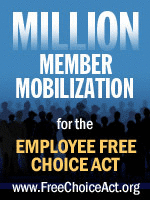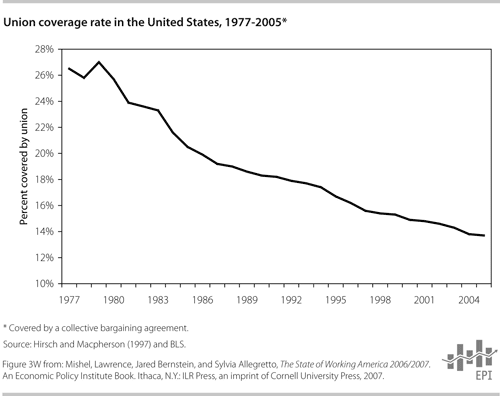

|
|
Corporations vs. You, the Worker
|
 Did you know there are 42 million American workers who want to be in a union but can't join one. You may be one of these individuals. The First Amendment protects our right to freely associate, yet millions of Americans are blocked from organizing in one of our most common, and vital, daily activities -- the workplace. Did you know there are 42 million American workers who want to be in a union but can't join one. You may be one of these individuals. The First Amendment protects our right to freely associate, yet millions of Americans are blocked from organizing in one of our most common, and vital, daily activities -- the workplace.
The Employee Free Choice Act (EFCA) is designed to allow workers to freely join unions and engage in collective bargaining with their employers. After decades of economic decline for workers, this legislation will help rebuild the middle class by expanding health care, improving retirement security and raising the standard of living for America's working families. Your bargaining rights are worth fighting for -- and voting for! click here to Support Free Choice Joshua Holland writes that "It's the EFCA -- the idea that working people who want to join a union can -- that has corporate America quaking in its collective boots."
History [1] The EFCA passed the House easily in 2007 -- by 56 votes -- and had majority support in the Senate, but it didn't reach the 60 votes required to kill a GOP-led filibuster. The corporate Right is building a massive "war chest" of funding, in part, in an attempt to maintain a firewall of at least 41 anti-union senators -- mostly Republicans joined by a few corporatist Dems -- to kill the bill in the 2009 Congress. President Bush threatened to veto the legislation if it had passed in 2007, but this time around, they fear that a Democrat will be sitting in the White House. Obama was a co-sponsor of the 2007 legislation; McCain opposed it. In preparation for Election 2008, Big Business has prepared a war chest of at least $150 million to stop progressive economic legislation that would seriously tax the rich. There is nothing more terrifying to corporate America than the prospect of dealing with its workforce on an even playing field, and, along with allies on the Right, it's pulling out all the stops to keep that from happening. At stake is much more than the usual tax breaks, trade deals and relentless deregulation; corporations are gearing up for a fight to preserve a status quo in which the largest share of America's national income goes to profits and the smallest share to wages since the Great Depression -- in fact, since the government started tracking those figures. (See You're Getting Creamed!) Why Unions Make All the Difference A common fallacy is that wages are determined by market forces. They're not. For a free market transaction to work, both the buyer and the seller need to have a good grasp of the value of the product being sold. In this case, we need to know the market value of a worker's sweat. When an individual worker alone negotiates a price for their labor with a traditional business, there's quite a bit of explicit and inherent coercion linked to the process. This is due to the power differential: a company that's shorthanded by one person will continue to function, while a person without a job is up a creek with no paddle, unable to put a roof over his or her head or food on the table. Unions, like corporations, have a great deal of information about the market. They know how a firm is doing, how profitable it is and where it is relative to the larger industry in which it operates. They know what deals workers at other plants have negotiated. They have attorneys who are just as familiar with the American labor laws as their counterparts in management. While an individual has very little leverage in negotiations -- again, most companies can do with one less worker -- collectively, an entire work force has the ability to shut down or at least slow down a company's operations if management chooses not to negotiate in good faith (as is often the case). It's not difficult to quantify the difference between what most hourly employees take home and what the free market would dictate. Economists Lawrence Mishel and Matthew Walters estimate the "union wage premium" -- the amount of additional pay a unionized worker receives compared with a similar worker who isn't a member of a union -- at around 20 percent (that's in keeping with other studies, using different methodologies, which put the premium in a range between 15 and 25 percent). If one includes benefits -- health care, paid vacations, etc. -- union members make almost 30 percent more than their nonunion counterparts. Data from the Organization for Economic Cooperation and Development (OECD) shows that "countries with high levels of union density or collective bargaining coverage are much more equal [in wages] than countries with low union density, but perform no worse in terms of creating jobs." The OECD finds that gaps between higher-paid and lower-paid workers are lowest where union density is high, and bargaining is either centralized or closely coordinated. For example, the top 10 percent of male full-time workers earn at least 4.6 times as much as the bottom 10 percent in the U.S., compared to 3.7 times as much in Canada, 2.9 times as much in Germany, and just 2.3 times as much in Sweden. High union density also narrows pay gaps between women and men, and between younger and older workers. By narrowing pay gaps, unions counter poverty and make family incomes much more equal than would otherwise be the case.The United States has seen a precipitous decline in the labor movement over the past three decades or so, and that decline has correlated with painful economic stagnation for all but the top of the economic food chain. Consider the following graph, via the Economic Policy Institute:  Union-busting has reached a high art form in the United States. Companies no longer need thugs and gun-toting Pinkertons to keep workers from exercising their legal rights to organize; now they have high-priced, Armani-wearing lawyers to do the job. The tactics are as subtle as they are insidious. A study by Cornell University labor scholar Kate Bronfenbrenner found that: 9 in 10 employers facing a union campaign force employees to attend closed-door meetings to hear anti-union propaganda; 80 percent train supervisors on how to attack unions and require them to deliver anti-union messages to workers they oversee; half of employers threaten to shut down the plant if workers organize; and 3 out of 4 hire outside consultants to run anti-union campaigns, "often based on mass psychology and distorting the law." Since the Reagan administration, U.S. labor protections have been thoroughly gutted, and companies that cross the line pay only modest penalties that can be written off as part of the cost of remaining union-free. The Employee Free Choice Act (EFCA) is simple: It beefs up penalties for employers who violate workers' rights under the law, creates a mediation and arbitration system for disputes, and allows workers to form a union if a majority simply sign a card saying they want representation. This bill alone won't reverse the long decline of American labor -- union organizers say more is needed to create a truly level playing field -- but it would be a huge step in the right direction. [1] Excerpted from "Corporate America Prepares for Battle Against Worker Campaign to Roll Back Assault on the Middle Class," by Joshua Holland. To read the complete article, visit AlterNet.org.
home |